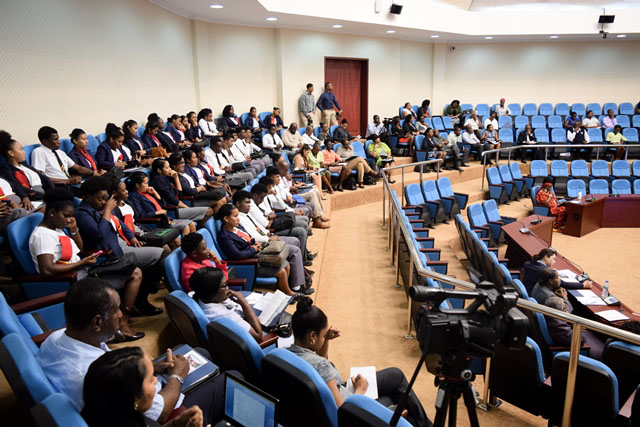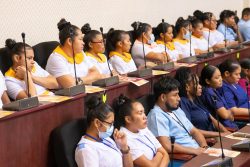The University of Guyana (UG) on Thursday launched a two-day symposium aimed at developing approaches to address the underperformance of boys in the education system.
The Symposium on Boys’ Education, organised under the theme “Bridging the Gender Divide: Stemming the Tide of Male Underachievement in the Education System,” was held at the Arthur Chung Convention Centre in collaboration with the Ministry of Education, The Commonwealth of Learning, UNICEF and CARICOM.
It precedes and will inform a project action planning workshop, which is to be held in the coming week, and which will involve the participation of education officers, and other representatives from both governmental and non-governmental agencies. The workshop will identify activities to address issues affecting boys.
“To date, we have not developed a strategic approach for the education system in Guyana. With every passing day, boys continue to slip further behind, curtailing their potential to contribute effectively to society. For these and other relevant reasons, the Faculty of Education is hosting a Symposium on Boys’ Education to identify ways of addressing this issue,” the university explained in a brochure.
It was further stated that the initiative is in keeping with efforts to meet Sustainable Development Goal #4, which aims to “Ensure inclusive and equitable quality education and promote lifelong learning opportunities for all.”
Dr Douglas Slater, Assistant Secretary General, Human and Social Development at CARICOM, stated that the discussions at the symposium would held to provide further insight into the “nature of gender in education in the CARICOM region.” He said that this information will hopefully be used to inform educational policies, transform pedagogical practices and drive professional development. He stated that solving the issue of male underachievement is critical for the success of Caribbean nations as it relates to the CARICOM Human Resource Development Strategy 2030.
“This symposium does provide an opportunity to bring together thought leaders, practitioners, academicians, researchers, from diverse disciplines from within and across the Caribbean so that they can connect in a Guyanese space—and I’m stressing that—to share and discuss ideas and innovations and practices. Ideas and innovations that hopefully elevate boys’ experience of school and schooling and by extension, improve learning outcomes and life challenges,” Dr Mairette Newman, representative of The Commonwealth of Learning, stated during her presentation at the launch.
Dr Newman referenced three notable statistics that shed light on the reality of the gender inequality in education: The fact that the gender gap in literacy widens as the ascension is made to higher grade levels, with boys dominating at lower proficiency levels, while girls dominate at higher proficiency levels; that girls outperform boys in many subject areas and are also more likely to remain in school; and that girls are more likely than boys to transition to tertiary education levels.
She pointed to underlying trends that have been identified, including the diminishing presence on men in boys’ lives, not only in the familial sphere, but in the school setting as well, where females dominate the teaching profession, and what has been known as the “feminisation of schooling.”
“Being able to work quietly, cooperatively in groups, communicate effectively, be receptive, be introspective, be diligent, be methodical… teachers value those behaviours… we demand them… girls fit that mold; boys don’t,” she explained.
Dr Newman related that research has shown that outside of a student’s ability, the second greatest influence on their performance is teaching.
“So, if we want to affect the learning outcomes of students, and I put in brackets ‘boys,’ teaching is key. But if that teaching and schooling generally favours girls’ behaviours and does not value or pay attention to boys, then we have a problem,” she stated. Minister of Education Dr Nicolette Henry, in her address, stated that discussions will have to be held to determine what a “modern curriculum should look like.” She expressed hopes that the discussions at the symposium would birth a fusion of ideas that can be incorporated into the local education system.
“As the responsible institution, the Ministry of Education must look at the data to reform policies, strategies and curriculum. And it is, therefore, opportune at this time that we undertake a very extensive curriculum reform and we have begun that process,” she related.
Thursday’s presentations were on the “Cross-section of boys’ performance in education,” done by a Ministry of Education representative; and a presentation titled “Needed! A paradigm shift for unravelling the problem of male underachievement”, presented by Professor Barbara Bailey. Those were to be followed by a panel discussion on “Voices and perspectives on boy’s experiences in education”.
Presentations planned for Friday were “Keeping boys out of risk—When that’s just where they want to be”, which will be presented by Shawn Hardnett, of the North Star College Preparatory Academy for Boys; Critical Mas: A collaborative project to co-design solutions with at-risk Caribbean youth,” to be presented by Dr Ngoni Chipere, of the University of the West Indies’ Open Campus; “Feminisation of Education—The absent male teacher,” by Dr Christopher Clarke, Principal of Shortwood Techers’ College in Jamaica; “Misconstruc-tions, Deconstructions and Reconstructions in Masculinity: Implications for Pedagogical Approaches to the teaching of male students in the Guyanese classroom,” by Dennis Gill, of the UG Berbice Campus; “Considerations for accelerating attendance, participation and performance,” to be presented by Education Specialist Audrey Michele Rodrigues and Michael Gillis, a Monitoring and Evaluation Specialist at UNICEF.
Their presentations were to be followed by two panel discussions: “Lessons from TVET—A Success Story,” by Patrick Onwuzirike, Deputy Chief Education Officer of the Ministry of Education; and the “Portrayal of males in the media,” by Enrico Woolford, the Chairman of the National Communica-tions Network’s Board of Directors.









